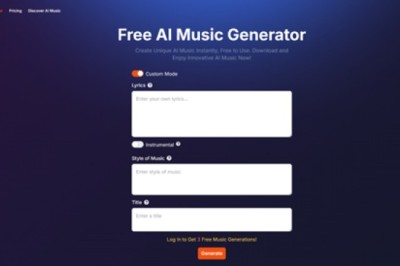views
Local SEO, or local search engine optimization, is a digital marketing strategy that aims to increase the visibility and ranking of a local business in online search results. The goal is to help a business appear prominently in search results when people search for products or services that are relevant to their location.
Local SEO involves optimizing a business's website and online presence to target specific geographic areas, such as cities or neighborhoods. This includes creating and optimizing local business listings on search engines like Google, Bing, and Yahoo, as well as other online directories and review sites. Local SEO also involves optimizing a business's website for local keywords and phrases, such as "best pizza in Brooklyn" or "plumber near me."
The benefits of local SEO are numerous, including increased visibility in online search results, higher website traffic, and more targeted leads and sales. Local SEO is especially critical for firms that have a physical location or offer SEO services in a particular geographic area.
What are the Local SEO Strategies?
Local SEO works by optimizing a business's online presence to target specific geographic areas and increase its visibility in local search results. Here are some of the key components of a successful local SEO strategy:
Google My Business
A free Google My Business profile is displayed in Google Maps and local search results. Optimizing and confirming your GMB profile is a key step in local SEO since it gives essential details about your business, such as your address, phone number, operating hours, and customer reviews.
On-Page SEO
On-page SEO refers to optimizing your website's content and structure for search engines. This includes using local keywords and phrases in your content, optimizing title tags and meta descriptions, and making sure your website is mobile-friendly.
Local Citations
A local citation is any online mention of your business's name, address, and phone number (NAP). Citations can be found in online directories, review sites, and social media profiles. Consistency and accuracy of NAP information across these citations are important for local SEO.
Reviews
Customer reviews are a key component of local SEO, as they can impact your business's visibility and ranking in local search results. Encourage customers to leave reviews on Google, Yelp, and other review sites, and respond to both positive and negative reviews.
Backlinks
links to your website from other websites are an important factor in search engine rankings. Building quality backlinks from local websites and directories can help improve your business's visibility in local search results.
By implementing these strategies and continually monitoring and refining your local SEO efforts, you can improve your business's visibility and attract more local customers.
Why is Local SEO Important?
Local SEO, or local search engine optimization, is the process of optimizing your online presence to attract more business from relevant local searches. Here are a few reasons why SEO is important:
Increases visibility and brand awareness
Local SEO makes your company show up on search engine results when consumers look for businesses like yours in a certain area. This increases your visibility and brand awareness.
Increases website traffic and leads
When your business appears in local search results, it can drive more traffic to your website, which can result in more leads and sales.
Targets relevant customers
Local SEO helps you target customers who are specifically looking for businesses like yours in their local area, which means you can reach a highly relevant audience.
Improves customer experience
Local SEO helps your business provide a better customer experience by ensuring that your business information, such as your hours of operation, address, and phone number, is accurate and up-to-date.
Levels the playing field for small businesses
Local SEO allows small businesses to compete with larger businesses in their local area by helping them appear in local search results.
How to Find Keywords for Local SEO?
Finding the right keywords is a crucial part of any Local SEO strategy. Here are some steps to help you find keywords for Local SEO:
Start with Google Keyword Planner
It is a free tool that can help you find keywords related to your business and location. Simply enter your business category and location, and the tool will provide you with a list of relevant keywords.
Analyze your competitors
Look at the websites of your competitors and see which keywords they are targeting. This can give you an idea of what keywords you should be focusing on.
Use location-specific keywords
Incorporate location-specific keywords into your website content and meta tags. For example, if you're a pizza restaurant in New York City, you may want to include keywords like "pizza restaurant in NYC" or "Best Digital Marketing Company in Delhi."
Use long-tail keywords
Long-tail keywords are longer phrases that are more specific and targeted. These keywords may have a lower search volume, but they can also be less competitive. For example, instead of targeting "pizza restaurant," you could target "gluten-free pizza restaurant in NYC."
Use Google's Autocomplete feature
Start typing a keyword related to your business and location into Google's search bar and see what suggestions come up. These suggestions can provide you with ideas for additional keywords to target.
Check your Google My Business Insights
Your Google My Business listing can provide you with insights into what keywords people are using to find your business. Use this information to refine your keyword strategy.
What are The Best Local SEO Tools?
There are a variety of tools available to help with Local SEO. Here are some popular tools:
Google My Business
It is a free tool that allows businesses to manage their online presence across Google, including Google Maps and Google Search. With Google My Business, you can manage your business information, interact with customers, and track your online performance.
Moz Local
Moz Local is a tool that allows you to manage your business listings across multiple online directories. With Moz Local, you can ensure that your business information is consistent and accurate across the web, which can help improve your Local SEO.
BrightLocal
BrightLocal is an all-in-one tool that includes features for managing business listings, tracking online reviews, and analyzing local search performance. BrightLocal can help you identify areas where you can improve your Local SEO and track your progress over time.
SEMrush
SEMrush is a popular SEO tool that includes features for both traditional and Local SEO. With SEMrush, you can research keywords, track your search engine rankings, analyze your competitors, and more.
Whitespark
Whitespark is a tool that specializes in local search and citation building. With Whitespark, you can identify opportunities for local citations, track your online reviews, and monitor your search engine rankings.
Traditional SEO Vs Local SEO: Which is Best for You
|
Criteria |
Traditional SEO |
Local SEO |
|
Target audience |
Broad/general audience |
Local audience |
|
Keyword focus |
General keywords |
Location-specific keywords |
|
Content focus |
Broad/general content |
Location-specific content |
|
Strategy focus |
National or international strategy |
Local strategy |
|
Search engine ranking factors |
Quality content, backlinks, website structure, mobile responsiveness |
Google My Business listing, local citations, online reviews, quality content |
|
Results timeline |
Longer timeline to see results |
Faster results |
|
Competition |
More competitive, higher costs |
Less competitive, lower costs |
|
Budget |
Higher budget required for broader targeting |
Lower budget required for targeting a specific location |
|
Business type |
Best for businesses that operate online or have a national or international audience |
Best for local businesses with a physical storefront or service area |

























Comments
0 comment